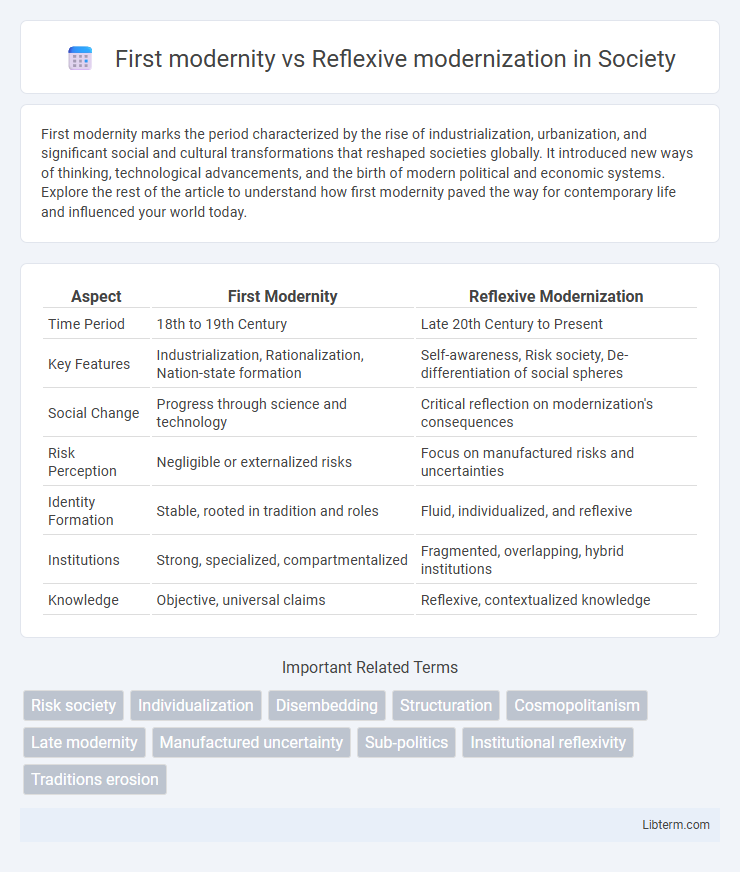First modernity marks the period characterized by the rise of industrialization, urbanization, and significant social and cultural transformations that reshaped societies globally. It introduced new ways of thinking, technological advancements, and the birth of modern political and economic systems. Explore the rest of the article to understand how first modernity paved the way for contemporary life and influenced your world today.
Table of Comparison
| Aspect | First Modernity | Reflexive Modernization |
|---|---|---|
| Time Period | 18th to 19th Century | Late 20th Century to Present |
| Key Features | Industrialization, Rationalization, Nation-state formation | Self-awareness, Risk society, De-differentiation of social spheres |
| Social Change | Progress through science and technology | Critical reflection on modernization's consequences |
| Risk Perception | Negligible or externalized risks | Focus on manufactured risks and uncertainties |
| Identity Formation | Stable, rooted in tradition and roles | Fluid, individualized, and reflexive |
| Institutions | Strong, specialized, compartmentalized | Fragmented, overlapping, hybrid institutions |
| Knowledge | Objective, universal claims | Reflexive, contextualized knowledge |
Understanding First Modernity: Foundations and Characteristics
First modernity is characterized by the emergence of industrialization, rationalization, and the establishment of nation-states, which laid the foundations for centralized governance and economic growth. It emphasizes linear progress through scientific knowledge, technological innovation, and standardized social institutions such as education and bureaucracy. The focus on fixed social structures and collective identities defines the stabilization of modern society during this foundational period.
The Emergence of Reflexive Modernization
Reflexive modernization emerges as a response to the limitations of first modernity, characterized by a critical self-awareness of societal progress and its unintended consequences. This phase shifts focus from industrial growth and structural functionalism to the risks and uncertainties generated by technological and institutional advancements. The rise of reflexive modernization highlights a transformation in social consciousness, emphasizing continuous self-examination and adaptation in modern societies.
Key Theorists: Giddens, Beck, and Lash
Anthony Giddens conceptualizes first modernity as a traditional industrial society characterized by established social norms, while reflexive modernization involves self-critical knowledge production and transformation of these norms. Ulrich Beck highlights the proliferation of "risk society," where technological and ecological risks challenge established certainties, urging societies to constantly reassess and adapt. Scott Lash emphasizes the cultural and social shifts in reflexive modernization, focusing on the reflexivity of institutions and individuals in navigating rapidly changing, globalized conditions.
Social Institutions in First Modernity vs Reflexive Modernization
First modernity established social institutions based on stable norms, hierarchical structures, and clear roles, emphasizing tradition and collective identity as foundational to societal order. Reflexive modernization transforms these institutions through self-examination, questioning previous assumptions and embracing complexity, leading to decentralized, flexible, and individualized social structures. This shift redefines social institutions by promoting adaptability, transparency, and the integration of risk management in response to evolving technological and cultural challenges.
Risk Society: A Hallmark of Reflexive Modernization
Risk society is a fundamental concept in reflexive modernization, highlighting how modern societies increasingly face and manage hazards generated by their own technological and industrial advancements. Unlike first modernity, which emphasized progress and control over nature, reflexive modernization involves the critical self-examination of risks such as environmental pollution, nuclear threats, and global climate change. This shift redefines social priorities and policies as societies become more aware of unintended consequences and uncertainties produced by modernization itself.
Individualization and Changing Social Roles
First modernity emphasizes structured social roles and collective identities shaped by industrialization and bureaucratic institutions, leading to relatively stable frameworks for individual behavior. Reflexive modernization transforms these frameworks by promoting individualization, where traditional roles become fluid and individuals actively construct their identities amidst rapid social change. This shift fosters greater personal autonomy but also generates uncertainties as individuals navigate evolving, less predictable social landscapes.
Knowledge, Science, and Technology: Evolution Across Modernities
First modernity emphasizes linear progress in knowledge, science, and technology, focusing on foundational discoveries and industrial advancements that shape society's growth. Reflexive modernization critically reevaluates these developments, highlighting the risks, uncertainties, and unintended consequences associated with technological and scientific innovation. This evolution reflects a shift from unquestioned trust in progress to a nuanced understanding of knowledge production within complex socio-technical systems.
Globalization in First and Reflexive Modernity
First modernity is characterized by the rise of industrialization, centralized nation-states, and linear progress, driving globalization through expanding markets and standardized institutions. Reflexive modernization, by contrast, emphasizes critical self-examination of modern society, highlighting global risks, environmental challenges, and cultural diversity reshaping globalization into more complex, reflexive networks. This shift transforms globalization from a unidirectional spread of modernity to a multifaceted, contested process involving global interdependencies and localized responses.
Challenges and Critiques of Modernization Theories
First modernity, characterized by industrialization, bureaucratization, and rationalization, faces critiques for its linear progress assumption and neglect of environmental and social inequalities. Reflexive modernization addresses these challenges by emphasizing the self-critical nature of modern societies, highlighting risks such as ecological degradation and technological uncertainties. Both theories struggle to fully account for cultural diversity and global power imbalances in contemporary modernization processes.
Navigating the Future: Lessons from First Modernity and Reflexive Modernization
First modernity emphasized linear progress through industrialization and rationalization, shaping societal institutions around fixed principles and growth models. Reflexive modernization shifts focus toward self-awareness, recognizing risks and contradictions inherent in technological and social change, prompting adaptive responses to emerging challenges. Navigating the future requires integrating the strengths of first modernity's structured development with reflexive modernization's critical evaluation and flexibility.
First modernity Infographic

 libterm.com
libterm.com